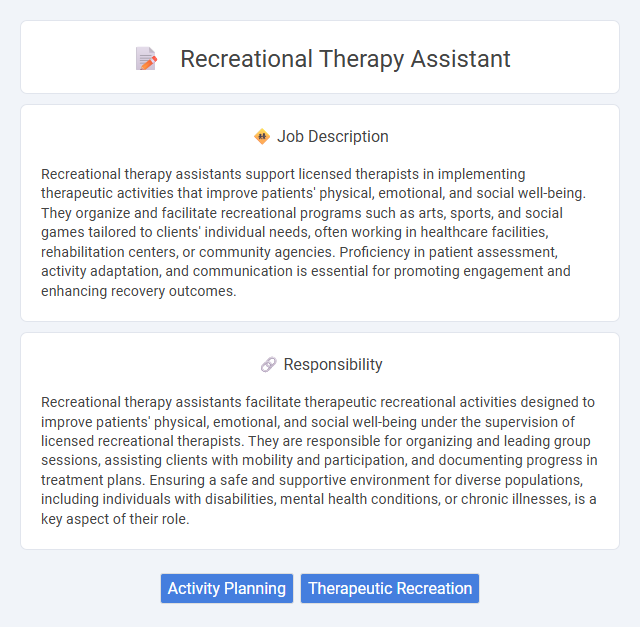
Recreational therapy assistants support licensed therapists in implementing therapeutic activities that improve patients' physical, emotional, and social well-being. They organize and facilitate recreational programs such as arts, sports, and social games tailored to clients' individual needs, often working in healthcare facilities, rehabilitation centers, or community agencies. Proficiency in patient assessment, activity adaptation, and communication is essential for promoting engagement and enhancing recovery outcomes.
Individuals with strong interpersonal skills and a compassionate nature are likely to be well-suited for a recreational therapy assistant role, as this position often involves working with patients facing physical, emotional, or cognitive challenges. Those who find fulfillment in helping others engage in therapeutic activities to improve their quality of life may probably thrive in this job. People with patience and adaptability could be better equipped to handle the varying needs of clients in this therapeutic setting.
Qualification
Recreational therapy assistants require a high school diploma and often complete specialized postsecondary training or an associate degree in recreational therapy or a related field. Certification from the National Council for Therapeutic Recreation Certification (NCTRC) enhances employment prospects and validates competency in implementing therapeutic recreational activities. Strong interpersonal skills and knowledge of adaptive recreational techniques are essential to assist therapeutic recreation specialists in improving clients' physical, emotional, and social well-being.
Responsibility
Recreational therapy assistants facilitate therapeutic recreational activities designed to improve patients' physical, emotional, and social well-being under the supervision of licensed recreational therapists. They are responsible for organizing and leading group sessions, assisting clients with mobility and participation, and documenting progress in treatment plans. Ensuring a safe and supportive environment for diverse populations, including individuals with disabilities, mental health conditions, or chronic illnesses, is a key aspect of their role.
Benefit
Recreational therapy assistants likely improve patients' physical and mental well-being by facilitating engaging activities designed to enhance recovery and quality of life. They probably support therapeutic goals through personalized recreation plans that encourage social interaction and emotional growth. This supportive role may also reduce healthcare costs by promoting faster rehabilitation and decreased reliance on medication.
Challenge
Recreational therapy assistants likely face challenges in adapting therapeutic activities to meet diverse client needs and abilities. They probably encounter situations requiring quick problem-solving to maintain engagement and motivation among participants. Managing unpredictable client behaviors and facilitating inclusive group dynamics may also present ongoing difficulties in this role.
Career Advancement
Recreational therapy assistants support recreational therapists in implementing treatment plans to improve patients' physical and mental well-being. Gaining certification as a Certified Therapeutic Recreation Specialist (CTRS) enhances job prospects and credibility in the field. Career advancement opportunities include progressing to lead recreational therapist roles, specializing in areas such as geriatrics or rehabilitation, and pursuing further education for clinical or administrative positions.
Key Terms
Activity Planning
Recreational therapy assistants design and implement engaging activity plans tailored to clients' physical, emotional, and cognitive needs. They collaborate with therapists to develop personalized recreational programs that promote social interaction, motor skills, and mental well-being. Effective activity planning enhances clients' quality of life through therapeutic recreation and meaningful participation.
Therapeutic Recreation
Recreational therapy assistants support therapeutic recreation programs by implementing activities that promote physical, emotional, and social well-being for clients with disabilities or chronic illnesses. They collaborate with recreational therapists to design personalized treatment plans that enhance motor skills, cognitive function, and social interaction. Proficiency in adaptive recreation techniques and strong communication skills are essential for ensuring effective patient engagement and progress.
 kuljobs.com
kuljobs.com